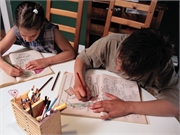- Could Your Grocery Store Meat Be Causing Recurring UTIs?
- Are You Making This Expensive Thermostat Error This Winter?
- Recognizing the Signs of Hypothyroidism
- 10 Strategies to Overcome Insomnia
- Could Artificial Sweeteners Be Aging the Brain Faster?
- Techniques for Soothing Your Nervous System
- Does the Water in Your House Smell Funny? Here’s Why
- Can a Daily Dose of Apple Cider Vinegar Actually Aid Weight Loss?
- 6 Health Beverages That Can Actually Spike Your Blood Sugar
- Treatment Options for Social Anxiety Disorder
How to Keep Housebound Kids Busy During a Pandemic

If you and the kids are staying home to avoid the coronavirus, the American Academy of Pediatrics (AAP) offers this advice to help you make the best of the situation.
Make a plan. Talk to your children about daily structure, dealing with stress, and when you’ll take breaks from remote work and schoolwork.
Ask teachers about online and offline educational activities for your kids. School districts may be able to help connect low-income families to free Wi-Fi or devices.
Use social media to check in with neighbors, friends and loved ones. If your kids miss their school friends or relatives, try video chats or social media to stay in touch.
Decide how much time kids can play video games online with friends, and where their devices will charge at night. Challenge your children to practice “tech self-control” and turn off the TV, tablet or video game themselves, rather than having you remind them.
If you work from home, expect to make adjustments. But it’s also an opportunity. Encouraging imaginative “work” play, for instance, could be a way to have a “take your child to work day” at home.
Podcasts and audiobooks can keep your children’s minds engaged while you work or do other tasks.
Do offline activities that help your family relax and communicate. Take walks outside, play board games, read together, have family dance parties and do activities that spark your children’s interest.
Get ideas from other families and share your ideas with them.
Create opportunities for family members to share their worries, and monitor your own technology use. If you focus too much on the news or social media and stress out, your kids will notice. Take a break to protect your mental health.
Be sure that everyone gets the sleep, physical activity, reading, reflective downtime and family connection time they need.
More information
PBS.org has more on new home routines with children while avoiding the coronavirus.
Source: HealthDay
Copyright © 2026 HealthDay. All rights reserved.










